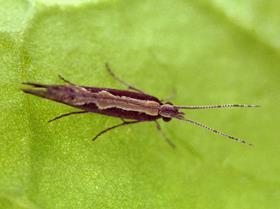
Brassica growers have been warned to remain vigilant and 'not assume controls will work' on the recent explosion of Diamond Back Moths (DBM).
Researchers working for Rothamsted Research have recorded “exceptionally high” numbers of moths over the past month, although the first generation has now begun to end. The second generation of adult moths is expected to appear in late July/early August, depending on temperatures.
“Continue checking crops and don’t assume control will work – check again in the days following treatment for caterpillars,” said Rothamsted’s light-trap network coordinator, Chris Shortall. “In terms of the moths’ level of resistance, work is ongoing with the progeny of wild-caught moths, but is proving to be a slow process. We don’t have results yet.”
Moth numbers have been extraordinarily high across the UK, Shortall said, with high numbers recorded in Devon, Scotland and Berkshire, and field reports of clouds of moths in Herefordshire, Norfolk and the Isle of Man.
Organic grower Joe Rolfe, of Norfolk-based firm Taylorgrown, said he’s “never seen anything like it'. “They’re everywhere, in the kitchen, when you’re mowing your lawn,” he said. “Two years ago we saw fairly large numbers and had some crop write offs. We haven’t seen many caterpillars this year yet, we’re netting crops using EnviroMesh, so that might be why. But last time they dropped eggs through the net, which created an even worse environment.”
Commercial director at Lincolnshire brassica grower T.H.Clements, Richard Mowbray, said: “Two to three weeks ago we started seeing lots of numbers. We thought we had good controls as we didn’t see caterpillars hatching until 14 days later, whereas usually it’s about 10 days. But we think this year they are just hatching later.”
Mowbray said the company is using traditional crop protection products for moths and caterpillars, but said netting crops is worse as moths get underneath. “There has been variable damage across fields – some have seen serious damage, and some is more patchy. We won’t know the full extent of the damage for a little while,” he said.
Taylorgrown is using some bacterial controls in place of spraying, Rolfe said, adding that the wet weather and cool temperatures may have kept numbers down so far. “We’ve been really lucky not to see an explosion so far, but I think there is worse to come. They have quite a long gestational period.”
Rolfe said the DBM is quite particular about what crop it attacks – it prefers cauliflower and cabbage to broccoli, but will attack all brassicas.



